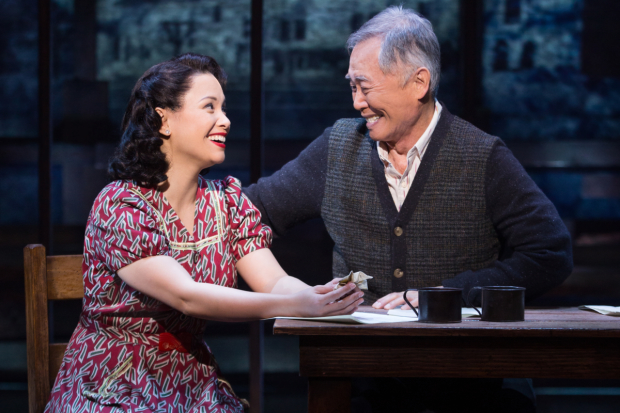Allegiance
George Takei stars in a new musical about Japanese internment during World War II.

(© Matthew Murphy)
A concentration camp seems like the last place one would want to set a musical, but that is exactly what has been done by the writers of Allegiance, now making its Broadway debut at the Longacre Theatre. Shockingly, it works: Not only is Allegiance a grandiose epic reminiscent of Miss Saigon, it also serves as a compelling family drama. The fact that this story of Japanese internment during World War II features an original book and score is also refreshing in a market saturated with jukebox musicals and stage adaptations of popular films. In that respect, Allegiance is delightfully old-school: a big schmaltzy musical of dubious historical accuracy delivered with ample humor and heart.
That’s all the more surprising considering the writers are relative novices: Although composer Jay Kuo and book writer Lorenzo Thione have served as producers for a series of Broadway flops (and the marginally successful American Idiot), this is their first-time collaboration as a writing team. The third man in the room, co-book writer Marc Acito (author of the hilarious novel Attack of the Theater People as well as the Encores! adaptation of The Band Wagon) is also making his Broadway writing debut. It’s a valiant first effort for the trio that, while by no means game-changing, succeeds in telling a worthy story through a melodic score and visually impressive staging.
Vaguely based on the real-life experiences of actor George Takei (who spent several of his childhood years interned at the Rohwer and Tule Lake “relocation centers”), Allegiance follows the Kimura family: Tatsuo (Christòpheren Nomura) is a successful California farmer living with his daughter Kei (Lea Salonga), son Sam (Telly Leung), and father Ojii-chan (the irresistibly charming Takei). They exist in a typical casserole of parental expectations and childhood rebellion until the outbreak of war upends everything. Along with 120,000 other Japanese-Americans, the Kimuras are interned, classified “enemy aliens” even though the kids are American citizens. Sam thinks the best way to get out of this situation is to prove his family’s loyalty by joining the 442nd-infantry regiment, a combat team in the U.S. Army comprised entirely of Japanese-Americans. Meanwhile, Kei falls for fellow internee Frankie Suzuki (Michael K. Lee), who opts to defy any effort to draft him into this “suicide battalion.” Enlist or resist: The decisions they make threaten to tear the family apart.
Filled with overwrought characters in exaggerated circumstances, Allegiance is a heady mix of history and myth, unforgivable for historians (documentarian Frank Abe has raised several valid objections), but irresistible for lovers of the musical theater. Kuo’s melodious and stirring score features lively 1940s pastiche and sentimental pop ballads. Lynne Shankel’s lovely orchestrations give the music a distinctively Japanese flair, subtly enhanced by Kai Harada’s sound design: Chillingly, we hear faint wind chimes as the women lift the dog tags from their fallen men in the 442. The whole show feels a lot like Les Misérables with a koto.
Stafford Arima’s fast-paced, ever-moving production reinforces that tone. Donyale Werle’s skeletal set flows on and off, augmented by Darrel Maloney’s evocative projections. Alejo Vietti’s period costumes present an authentic array of double-breasted wool suits and general-issue army uniforms. The cast works up a sweat dancing to Andrew Palermo’s swinging choreography, especially Frankie’s dazzling showstopper “Paradise,” a sardonic critique of American exceptionalism set to a grotesquely infectious beat. If you didn’t know any better, you might think it was a lost Brecht-Weill collaboration.
On the opposite end thematically and stylistically, Sam is a desperately earnest flag-waver. Leung plays him with wild-eyed charisma, conveying the implacable faith of a true believer. No matter how many times America stabs him in the back he can only bleed red, white, and blue. Few musicals have so thoughtfully captured the angst of second-generation Americans, trapped between two cultures, not fully understood or accepted by either.
As his sister Kei, Salonga offers a far more subdued performance — until she starts singing. Truly, no one can sell a song quite like Salonga: She turns the anthemic “Higher” into an instant classic with her heartfelt and soaring interpretation. With that one song, she unpacks her complex relationship with Sam, both as a surrogate mother and also as a somewhat envious sister denied the confidence lavished on the family’s only son.
Amid all this heavy drama and latent feminism, there’s plenty of comic relief thanks to a generally witty book and funny performances (the amiably awkward Katie Rose Clarke stands out for her portrayal of Nurse Hannah). The unassuming and smiley Mrs. Tanaka (Rumi Oyama with spot-on timing) breaks up a tense moment in the camp infirmary when she asks in heavily accented English, “Hello, do you please have poison?” Even in such terrible circumstances, there’s plenty of light to be found in the darkness.
All this makes Allegiance an enjoyable piece of musical theater, just not a very reliable account of historical fact. (For that, readers might want to pick up Richard Reeves’ excellent book Infamy: The Shocking Story of the Japanese-American Internment in World War II.) Despite all its embellishments, the show shines a light on the choices members of an embattled minority group often have to make in our imperfect republic. That emotional truth is likely to resonate far beyond America’s Japanese diaspora.








